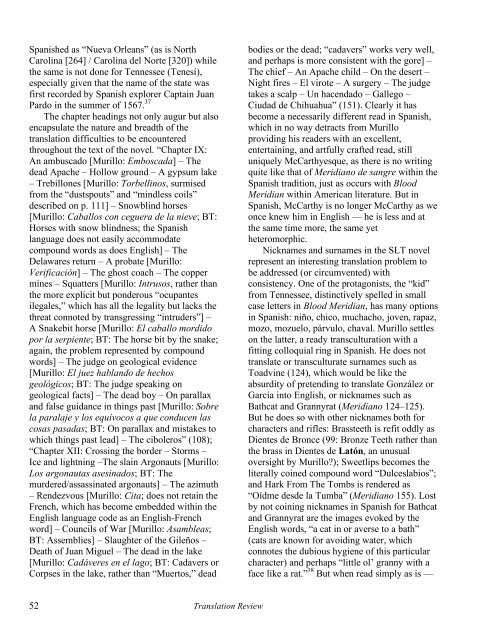Translation Review - The University of Texas at Dallas
Translation Review - The University of Texas at Dallas
Translation Review - The University of Texas at Dallas
Create successful ePaper yourself
Turn your PDF publications into a flip-book with our unique Google optimized e-Paper software.
Spanished as “Nueva Orleans” (as is North<br />
Carolina [264] / Carolina del Norte [320]) while<br />
the same is not done for Tennessee (Tenesí),<br />
especially given th<strong>at</strong> the name <strong>of</strong> the st<strong>at</strong>e was<br />
first recorded by Spanish explorer Captain Juan<br />
Pardo in the summer <strong>of</strong> 1567. 37<br />
<strong>The</strong> chapter headings not only augur but also<br />
encapsul<strong>at</strong>e the n<strong>at</strong>ure and breadth <strong>of</strong> the<br />
transl<strong>at</strong>ion difficulties to be encountered<br />
throughout the text <strong>of</strong> the novel. “Chapter IX:<br />
An ambuscado [Murillo: Emboscada] – <strong>The</strong><br />
dead Apache – Hollow ground – A gypsum lake<br />
– Trebillones [Murillo: Torbellinos, surmised<br />
from the “dustspouts” and “mindless coils”<br />
described on p. 111] – Snowblind horses<br />
[Murillo: Caballos con ceguera de la nieve; BT:<br />
Horses with snow blindness; the Spanish<br />
language does not easily accommod<strong>at</strong>e<br />
compound words as does English] – <strong>The</strong><br />
Delawares return – A prob<strong>at</strong>e [Murillo:<br />
Verificación] – <strong>The</strong> ghost coach – <strong>The</strong> copper<br />
mines – Squ<strong>at</strong>ters [Murillo: Intrusos, r<strong>at</strong>her than<br />
the more explicit but ponderous “ocupantes<br />
ilegales,” which has all the legality but lacks the<br />
thre<strong>at</strong> connoted by transgressing “intruders”] –<br />
A Snakebit horse [Murillo: El caballo mordido<br />
por la serpiente; BT: <strong>The</strong> horse bit by the snake;<br />
again, the problem represented by compound<br />
words] – <strong>The</strong> judge on geological evidence<br />
[Murillo: El juez hablando de hechos<br />
geológicos; BT: <strong>The</strong> judge speaking on<br />
geological facts] – <strong>The</strong> dead boy – On parallax<br />
and false guidance in things past [Murillo: Sobre<br />
la paralaje y los equívocos a que conducen las<br />
cosas pasadas; BT: On parallax and mistakes to<br />
which things past lead] – <strong>The</strong> ciboleros” (108);<br />
“Chapter XII: Crossing the border – Storms –<br />
Ice and lightning –<strong>The</strong> slain Argonauts [Murillo:<br />
Los argonautas asesinados; BT: <strong>The</strong><br />
murdered/assassin<strong>at</strong>ed argonauts] – <strong>The</strong> azimuth<br />
– Rendezvous [Murillo: Cita; does not retain the<br />
French, which has become embedded within the<br />
English language code as an English-French<br />
word] – Councils <strong>of</strong> War [Murillo: Asambleas;<br />
BT: Assemblies] – Slaughter <strong>of</strong> the Gileños –<br />
De<strong>at</strong>h <strong>of</strong> Juan Miguel – <strong>The</strong> dead in the lake<br />
[Murillo: Cadáveres en el lago; BT: Cadavers or<br />
Corpses in the lake, r<strong>at</strong>her than “Muertos,” dead<br />
bodies or the dead; “cadavers” works very well,<br />
and perhaps is more consistent with the gore] –<br />
<strong>The</strong> chief – An Apache child – On the desert –<br />
Night fires – El virote – A surgery – <strong>The</strong> judge<br />
takes a scalp – Un hacendado – Gallego –<br />
Ciudad de Chihuahua” (151). Clearly it has<br />
become a necessarily different read in Spanish,<br />
which in no way detracts from Murillo<br />
providing his readers with an excellent,<br />
entertaining, and artfully crafted read, still<br />
uniquely McCarthyesque, as there is no writing<br />
quite like th<strong>at</strong> <strong>of</strong> Meridiano de sangre within the<br />
Spanish tradition, just as occurs with Blood<br />
Meridian within American liter<strong>at</strong>ure. But in<br />
Spanish, McCarthy is no longer McCarthy as we<br />
once knew him in English — he is less and <strong>at</strong><br />
the same time more, the same yet<br />
heteromorphic.<br />
Nicknames and surnames in the SLT novel<br />
represent an interesting transl<strong>at</strong>ion problem to<br />
be addressed (or circumvented) with<br />
consistency. One <strong>of</strong> the protagonists, the “kid”<br />
from Tennessee, distinctively spelled in small<br />
case letters in Blood Meridian, has many options<br />
in Spanish: niño, chico, muchacho, joven, rapaz,<br />
mozo, mozuelo, párvulo, chaval. Murillo settles<br />
on the l<strong>at</strong>ter, a ready transcultur<strong>at</strong>ion with a<br />
fitting colloquial ring in Spanish. He does not<br />
transl<strong>at</strong>e or transcultur<strong>at</strong>e surnames such as<br />
Toadvine (124), which would be like the<br />
absurdity <strong>of</strong> pretending to transl<strong>at</strong>e González or<br />
García into English, or nicknames such as<br />
B<strong>at</strong>hc<strong>at</strong> and Grannyr<strong>at</strong> (Meridiano 124–125).<br />
But he does so with other nicknames both for<br />
characters and rifles: Brassteeth is refit oddly as<br />
Dientes de Bronce (99: Bronze Teeth r<strong>at</strong>her than<br />
the brass in Dientes de L<strong>at</strong>ón, an unusual<br />
oversight by Murillo?); Sweetlips becomes the<br />
literally coined compound word “Dulceslabios”;<br />
and Hark From <strong>The</strong> Tombs is rendered as<br />
“Oídme desde la Tumba” (Meridiano 155). Lost<br />
by not coining nicknames in Spanish for B<strong>at</strong>hc<strong>at</strong><br />
and Grannyr<strong>at</strong> are the images evoked by the<br />
English words, “a c<strong>at</strong> in or averse to a b<strong>at</strong>h”<br />
(c<strong>at</strong>s are known for avoiding w<strong>at</strong>er, which<br />
connotes the dubious hygiene <strong>of</strong> this particular<br />
character) and perhaps “little ol’ granny with a<br />
face like a r<strong>at</strong>.” 38 But when read simply as is —<br />
52 <strong>Transl<strong>at</strong>ion</strong> <strong>Review</strong>

















